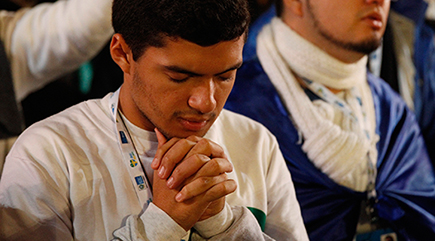
Here are some ways you can open your heart to Our Lord the next time you are in adoration
Ask the saints
If you find it hard to focus during adoration, ask Our Lady, the saints and your guardian angel to help you. Sometimes we forget that we aren’t in the spiritual fight alone. As the Letter to the Hebrews reminds us, “we are surrounded by so great a cloud of witnesses” (12:1), who want us to draw close to Our Lord.
Read Sacred Scripture
There is no better place to read the word of God than in the presence of the Word made flesh. Some beautiful passages on the mystery of the Eucharist are John 6, Luke 24:13-35 and 1 Corinthians 11:23-26.
Meditation
The Scriptures also offer a great a way to pray through difficulties in our own personal lives. Passages such as the calming of the storm at sea (Mk 4:35-41), the Sermon on the Mount (Mt 6:25-34) and the Psalms can help us reflect on God’s presence in the midst of our struggles.
Spiritual reading
Many saints had a great devotion to the Eucharist. Reading some of their works, such as “The Holy Eucharist” by St. Alphonsus Liguori or the Eucharistic hymns and prayers by St. Thomas Aquinas could help foster your own devotion to Our Lord. Lives of the saints and other forms of spiritual reading are also great ways to engage in Eucharistic adoration and offer an opportunity to discuss with Our Lord how we can grow in the spiritual life.
Intercession
Spending time before the Eucharistic presence of Our Lord is a perfect time to pray for others. Maybe there is a family member undergoing surgery, a couple preparing for their wedding or a friend going through a difficult situation that you can bring before the Lord.
Offer a holy hour
There are many prayer books and websites with specific sets of devotions to offer an hour of Eucharistic adoration for priests, peace, in reparation for sin and other spiritual causes. The USCCB offers some examples on their Adoration page.
Prayer journal
Another fruitful practice for adoration is writing in a prayer journal. Some people use a journal to write letters to God, keep track of prayer intentions, record any inspirations they receive during adoration or simply focus their thoughts during prayer.
Spontaneous prayer
Prayer during Eucharistic adoration doesn’t have to be just pre-written prayers from someone else, it’s also a great chance to have a conversion, face-to-face so to speak, with Jesus. Some conversation starters include:
Thank you, Jesus, for ...
Lord, I’m really struggling with ...
God, today was ...
Jesus, I don’t understand ...
God, you have truly blessed me with ...
Look and listen
If you run out of things to say during adoration, that’s OK. An important part of prayer is listening to God, being still in his presence and letting him speak to you. Some people might find it helpful to close their eyes, others might prefer to gaze on the monstrance. A poor man once told St. John Vianney his simple prayer, “I look at him, and he looks at me.”